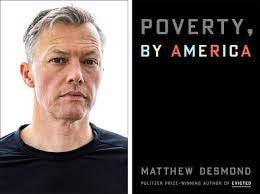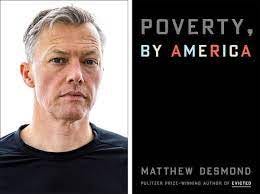At the beginning of Chris Gehrz’ class Monday night, he put me on the spot. He said that his students hadn’t taken sociology classes (except for one in high school) and could I give a quick definition of the approach. I fell back on my standard top-of-the-head response: “a study of the structures and relationships within social groups and the processes that support them”. I fleshed that out by describing how an intro to soc course deals with the processes (culture, norms, socialization) and institutions (economy, education, family, religion, politics).
Last weekend I finished reading Matthew Desmond’s new book, Poverty, by America. His previous book, Evicted, examined substandard housing in Milwaukee. It was originally his dissertation but the book won a Pulitzer for nonfiction and was instrumental in Desmond receiving a Macarthur genius grant. I heard him speak at Calvin University in 2017 and was thrilled to learn he had a new book coming out.
Many books on poverty focus solely on the conditions the poor face and the maladies they endure. The best of those evidences compassion. The worst feels like a trip to the zoo to look at the strange animals in their natural habitat.
Desmond’s book is a true sociological work in that it explores the structures and relationships and processes in my sociological definition.1 Near the end of his prologue, he explains:
To understand the causes of poverty, we must look beyond the poor. Those of us living lives of privilege and plenty must examine ourselves. Are we — we the secure, the insured, the housed, the college educated, the protected, the lucky — connected to all this needless suffering? This book is an attempt ot answer that question, addressed to that “we”. Which makes this book about poverty that is not just about the poor. Instead, it’s a book about how the other other half lives, and about how some lives are made small so that others will grow. (7-8)
Like Evicted, Poverty combines individual stories with statistics and policy analysis. He examines and dismisses the standard tropes explaining poverty: laziness, family structure, dependency, substance abuse, mental illness. When these are causally eliminated, focus turns to economic policy decisions made at state and national levels.
Desmond decries the Clinton-era welfare reform that created Temporary Assistance to Needy Families (TANF). The problem with TANF is that it became a block grant for the states to distribute as they see fit.2 The language of the welfare act allows states incredible leeway on how to spend that money, from abstinence education to Oklahoma marriage support to a Christian summer camp in Maine. Not all TANF funds go directly to Needy Families. Not only that, but much of TANF funds (like SNAP and SSI Disbility) go unclaimed. The obstacles to gaining those funds is simply too hard.
The decline of unions and the suppression of wages in the lower end of the economic spectrum is another part of the challenge. So are the exploitive entities that cause the poor to pay more: substandard housing landlords who charge rents at near the city average3, payday lenders with exorbitant repayment schemes, the lack of small scale banks that might compete with the big banks and their outrageous overdraft fees.
It’s fine to be mad at slumlords or payday scams or greedy bankers, but then Desmond gets personal. The reason we have poverty is because we’ve prioritized other things instead.
It’s often said that budgets are moral documents.4 Our lack of political effort to eliminate poverty5 isn't because we can't. It's because we decided to so something more politically palatable with our federal and state resources. The choices we've made are those that keep the non-poor happy.
He has some key examples that illustrate my own privilege. We have protected my home mortgage deduction so that interest on the largest purchase we make isn’t taxable. We have subsidized my prior employers to provide me with tax free health insurance. We allowed me to set aside retirement funds tax-free (which now provide my livelihood alongside social security). And of course, we keep taxes low on the wealthy and corporations.6
Desmond says that in 2020, it would have taken $177 billion above current welfare spending to bring those under the poverty line up to it. On one hand, that seems like a lot of money in a society overly concerned about the deficit.7 On the other hand, it pales in comparison to what we've done in Covid stimulus or extended unemployment.
If, Desmond argues, we eliminated the mortgage interest deduction, eliminated the salary cap on social security contributions, and taxed capital gains and dividends at the level of the common worker, we’d have $127 billion available. Then we could tackle tax avoidance.
It’s not that we can’t deal with poverty. It’s that we’re more committed to taking care of ourselves.
Communal prayer each week at my church begins by asking questions: who is in need of God’s healing, who is in need of God’s mercy, who is in need of God’s justice? I told the pastor over lunch last week that the third question always throws me because I don’t come in contact with those who need justice. But after reading Desmond, I realize that’s not true. We all need God’s justice. And just maybe that allows me to want my legislators to prioritize the poor instead of people like me.
This was true of Evicted as well but is much more evident here.
John Oliver’s Last Week Tonight did an excellent segment on TANF two weeks ago (language warning):
He notes that housing in areas of Indianapolis that were over 40% poverty paid rents that averaged 85% of those in the city overall between 2015 and 2019.
You’ll hear that a lot as the president and congress (hopefully) resolve the debt ceiling crisis.
One of my favorite MLK quotes is where is he says that “the War on Poverty wasn’t even a good skirmish”.
The Republican attacks on increased IRS employees who could deal with tax avoidance gets couched as protecting the little guy when it actually keeps those in poverty poor.
See my January newsletter about Modern Monetary Theory.





An especially good blog John.
Dick Etulain